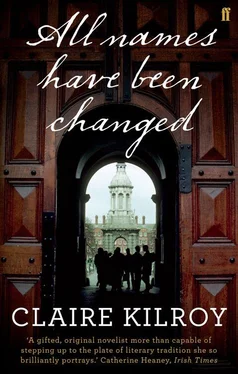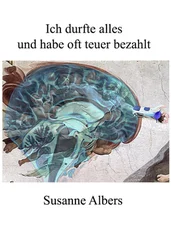The farewell to Glynn had taken less time than I’d allowed for, so I sat in the sun on the steps of the Reading Room to await the appointed hour, my rucksack at my feet. I put my head between my knees and contemplated Guinevere’s absence in terms of imagery, how stark the black railings beyond Front Arch would look without her. If this were a Glynn novel, she wouldn’t be there. I was under no illusions.
At one minute to three, the condemned rose and crossed the quad. It took my eyes a moment to adjust to the cool darkness beneath Front Arch after the brilliant May sunshine. A pigeon beat its wings in the vaulted ceiling with the violence of something trying to break. I did not falter. I would face whatever was there, or not there. I would go alone. I would leave Dublin without her. I had done it before.
The sunlight, when I emerged on the other side, was blinding. It bleached the world bare of detail. There was nothing. Nobody was waiting. Well then, I said to myself. Okay so. Are you happy now? I stood there in the middle of the entrance, blocking everyone, all the tourists, the undergrads, I didn’t care. Then a hand touched my shoulder. I dropped my rucksack.
I stooped and gathered Guinevere up, lifted her off the ground and buried my face in her hair. Thank you she says I chanted into her neck, and I take her word for it, I take her word. Around and around we went, revolving slowly, her feet dangling in the air. ‘Are you ready?’ I asked when I was able.
She nodded. ‘I’m ready.’
She accepted my hand and set her calm face to the street, as if joining me in a dance. Through the gates, onto Dame Street, uphill to Swift’s cathedral. I will call this moment the beginning.
Thanks to those who read and commented on drafts: Mia Kilroy, Simon Trewin, Simon McInerney, John Boyne and Liz O’Donnell. A very special thanks to the Arts Council of Ireland, An Chomhairle Ealaíon, for its generous financial support, and to Angus Cargill of Faber and Faber, esteemed editor.
Claire Kilroy’s debut novel All Summer was described in The Times as ‘compelling … a thriller, a confession and a love story framed by a meditation on the arts’, and was awarded the 2004 Rooney Prize for Irish Literature. Her second novel, Tenderwire was shortlisted for the 2007 Irish Novel of the Year and the Kerry Group Irish Fiction Award. It was followed, in 2009, by the highly acclaimed novel, All Names Have Been Changed . Educated at Trinity College, she lives in Dublin.












